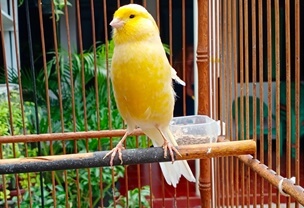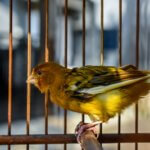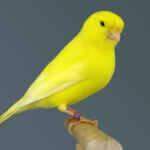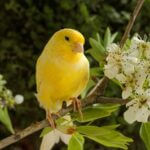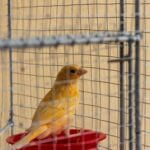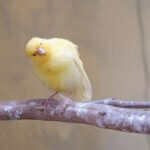Canaries have a fast metabolism, a delicate immune system, and an even more fragile respiratory system. This means that stress can devastate a canary’s health if it remains stressed for too long.
Keep a watchful eye for these signs of stress in canaries:
- Biting
- Screaming
- Aggressive behavior
- Quieter than usual
- Loss of appetite
- Repetitive behavior
- Destructive behavior
- Feather picking
- Stress bars
- Mutilation
Once you’ve identified that your canary is stressed, you can take steps to resolve the problem.
How To Tell If Your Canary Is Stressed?
The symptoms of stress are often behavioral. If your canary suddenly changes its habits, personality, or temperament, you can be sure it’s stressed (or ill, which is often caused by stress).
In some cases, these behavioral issues lead to severe physical problems. So, your canary could tear up its toys, scream, bite, and mutilate its skin and feathers.
Canary Stress Symptoms
Stress in canaries can manifest itself in subtle ways. To help determine the state of your canary’s mental health, look for these symptoms:
1/ Biting
Biting signifies your canary is experiencing pain, fear, or discomfort.
If your canary is suddenly biting you, itself, or other pets, it’s uncomfortable. This also counts if the canary bites sometimes but is now biting more often than usual.
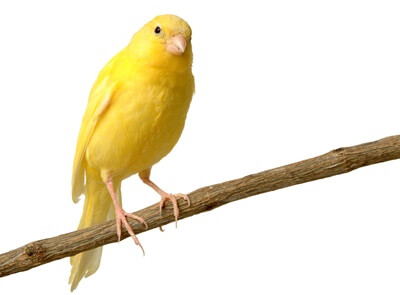
2/ Screaming
Screaming is rare for canaries, so it has a deeper meaning.
Birds that scream are often unhappy or bored. Screaming is their way of getting your attention so that it can get some much-needed enrichment or mental stimulation.
Like biting, screaming can also indicate illness or disease.
3/ Aggression
Stressed canaries show aggressive behaviors, such as scratching, nipping, or screeching. If other birds are in its cage, your canary may start fights.
This could be a method to get other birds away from it because it’s scared or in pain. However, it could also reflect boredom, so the canary scratches and nips to entertain itself.
4/ Quieter Than Usual
Stressed canaries will change their vocalization patterns. Sometimes this can be by becoming louder, like screaming. In other canaries, it manifests as becoming quieter.
This can be a difficult sign to notice in canaries. Canaries are known to stop singing or chattering due to molting season or changes in lighting.
So, your canary may go quiet for harmless reasons other than stress.
However, if you know your canary well, an abnormal silence will be very noticeable. Canaries may stop singing, chirping, or whistling altogether with no other obvious cause.
5/ Decrease in Appetite
Stressed canaries tend to eat less, leading to weight loss and malnutrition. Any changes in appetite are a common symptom of illness or disease.
6/ Repetitive Behavior
Repeating tricks or some dance moves is nothing to worry about in canaries. However, if your canary engages in repetitive behaviors constantly, it’s an obvious sign of stress.
Look out for habits such as:
- Pacing
- Toe-tapping
- Head bobbing
- Head swinging
- Knocking on objects
Repetitive behaviors are an effort for a canary to entertain itself.
However, the lack of external stimulus means this form of entertainment is limited and temporary. Eventually, a bored canary will resort to more obvious efforts, like destructive behavior.
If your canary starts doing repetitive behaviors, try giving it more enrichment.
For canaries, the best solution is to provide more room to hop around and fly in. Offer canaries a longer or bigger cage, and give them time outside the cage so they can roam in a canary-safe room.
7/ Destructive Behavior
Destructive canaries are often stressed from boredom, manifesting as:
- Biting and clawing at their perches and toys
- Shredding paper, rope, cloth, or toys
- Gnawing on the bars of their cage
When they don’t have anything to keep them mentally occupied, canaries will eventually resort to destroying their surroundings.
8/ Feather Picking
Canaries that are stressed can aim their destruction at themselves, so feather picking is common among birds that are heavily stressed and bored.
Feather picking is preening done to an extreme. Preening is a way to self-soothe, and feather picking is a maladaptive version of that behavior.
Feather picking often starts from a certain stimulus, especially one that causes stress.
For example, this can be a loud noise or the sight of a predator. However, canaries will continue to feather pick when the stimulus has passed.
Feather picking is a serious behavior that needs to be addressed. When the canary isn’t stressed anymore, the behavior should stop.
However, if it’s not stopped in time, a canary can develop feather picking as a habit. When this happens, a canary will still pick its feathers, even when the stressor has been addressed.
Canaries can damage the skin under the feathers, meaning that the feathers may not regrow.
9/ Skin And Bone Mutilation
Extremely stressed canaries may also begin to chew on their skin. In serious cases, they go deeper and destroy muscle and bone, which should be considered a medical emergency.
Canaries that chew on their skin have an impulsive behavior. If this isn’t addressed, it can worsen. There’s also a chance for the canary to damage an artery or cause permanent nerve damage.
10/ Stress Bars
Stress bars refer to lines that run horizontally on the shaft of a canary’s feathers. Canaries develop stress bars when they have been under stress for a long time.
It can be hard to see stress bars on feathers growing on the canary. However, canaries under stress will often molt or shed feathers, and it can be easy to see stress bars on those lost feathers.
Stress bars won’t indicate the reason why a canary is stressed. However, they’re a reliable indicator that your canary is under pressure, to the point where even their feathers’ growth pattern is affected.
Can Canaries Die from Stress?
Canaries can die from stress, as the adrenal gland kicks in when a canary is extremely upset, sending adrenaline through the body.
Adrenaline causes the following reactions:
- Increased sugar in the bloodstream
- Raised blood pressure
- Dilated blood vessels in muscles
Adrenaline is important for responding to immediate threats. For example, it allows a canary to move as quickly as possible when it needs to fly away.
However, adrenaline is bad for the body when a canary is regularly stressed, be it from disease or regularly being frightened. Canaries can become exhausted from the constant supply of adrenaline. The effects can be fatal when the body is exposed to it for long enough.
According to General and Comparative Endocrinology, even when stress doesn’t lead to premature death, exposure to a stressor can affect a canary’s long-term health.
How Do You Calm A Stressed Canary?
The solution to calming down a stressed canary is figuring out the cause of its discomfort. Removing the cause will get rid of the stress trigger(s).
Check for Illnesses
Canaries often become stressed when ill. Worse still, the more stressed a canary is, the more likely it is to become sick or diseased. This creates a vicious cycle that you’ll need to stop.
If your canary is stressed, check for other symptoms:
- Weakness and lethargy
- Change in droppings
- Wet or runny eyes and cere
- Tail bobbing
Canaries that don’t have a clear stressor may be unwell.

Modify Its Diet
According to Comparative Physiology, canaries with no fat stores had higher stress levels.
Ideally, canaries should be fed a pelleted diet supplemented with fruits, vegetables, seeds, and nuts.
However, if your canary is currently stressed, don’t change its food drastically, as it’ll worsen things. If you need to make tweaks, do so gradually, preferably over a few weeks.
Cage Assessment
Stress can be due to the canary’s cage setup, so do the following:
- Provide multi-level perches with a choice of perches toward the top of the cage.
- Cages should be against a corner or wall so that a canary doesn’t have blind spots.
- Provide places to hide inside the cage.
- Cover the cage when the sun goes down to aid sleep.
- Don’t allow predatory pets like cats to watch over the cage.
Enrichment
Here are some good boredom breakers:
- Place the cage in a family room or area you frequent, as canaries like to people-watch.
- Canaries get bored with toys, so put 3-4 toys in the cage and rotate in new ones.
- Give your canary access to a canary-proofed room and allow it to roam under supervision.
Quiet
Loud noises are stressful to canaries, as noise can indicate danger. So, keep the TV or radio at a comfortable volume and avoid shouting and screaming in the canary’s living space.

